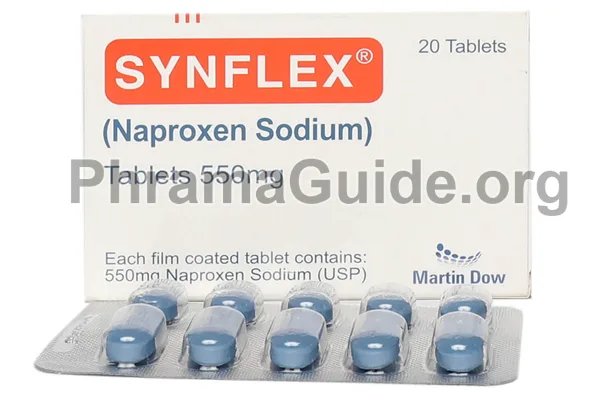Synflex Tablet is a nonsteroidal anti-inflammatory drug (NSAID) used to relieve pain and reduce inflammation in conditions such as arthritis, menstrual cramps, and various musculoskeletal disorders. While Synflex is an effective medication, it may also have side effects.
Common side effects of Synflex Tablet
- Gastrointestinal Issues: NSAIDs like Synflex Tablet can irritate the stomach lining and may lead to symptoms such as stomach pain, indigestion, heartburn, nausea, vomiting, or diarrhea. These symptoms are more likely if you take the medication on an empty stomach.
- Headache and Dizziness: Some people may experience headaches or dizziness while taking Synflex Tablet.
- Fluid Retention: Synflex Tablet can cause fluid retention, which may manifest as swelling of the hands, ankles, or feet. If you notice sudden or severe swelling, contact your healthcare provider.
- High Blood Pressure: In some cases, Synflex tablets can lead to an increase in blood pressure. Regular monitoring of blood pressure may be necessary while taking this medication.
- Kidney Function: Synflex tablets can affect kidney function, and in rare cases, it may lead to kidney problems. If you experience changes in urination patterns, pain in the lower back, or swelling, consult your healthcare provider.
- Liver Effects: In rare instances, Synflex tablets can cause liver problems. If you notice symptoms such as jaundice (yellowing of the skin or eyes), dark urine, or abdominal pain, seek medical attention.
- Skin Reactions: Although uncommon, some individuals may experience skin reactions, including rashes or hives, as a side effect of Synflex Tablet.
- Cardiovascular Effects: NSAIDs, including Synflex Tablet, have been associated with an increased risk of cardiovascular events like heart attack and stroke, especially when used at high doses or for extended periods. This risk is higher in individuals with pre-existing heart conditions.

What is Synflex?
Synflex is one of the leading brands of Naproxen Sodium, manufactured and marketed by Martin Dow Pakistan.
Synflex : Available Formulations and Strengths
Presently, Synflex is available in Tablet forms.
Synflex Tablets : 250mg, 275mg, 550mg Strengths.
What Are The Possible Drug Interactions of Synflex?
Synflex tablets, like many medications, can interact with other drugs you may be taking, potentially affecting their effectiveness or increasing the risk of side effects. It’s essential to inform your healthcare provider about all the medications, supplements, and over-the-counter drugs you are using to minimize the risk of adverse interactions. Here are some possible drug interactions with Synflex Tablet:
- Other NSAIDs: Concurrent use of multiple NSAIDs, such as ibuprofen or aspirin, with Synflex Tablet, can increase the risk of gastrointestinal bleeding and ulcer formation. Combining different NSAIDs is generally not recommended.
- Anticoagulants and Antiplatelet Drugs: Synflex Tablet can interfere with the blood’s ability to clot, and when used with anticoagulants (e.g., warfarin) or antiplatelet drugs (e.g., aspirin, clopidogrel), it can increase the risk of bleeding. Close monitoring and potential dosage adjustments may be necessary.
- Selective Serotonin Reuptake Inhibitors (SSRIs) and Serotonin-Norepinephrine Reuptake Inhibitors (SNRIs): Concurrent use of Synflex Tablet with SSRIs or SNRIs, commonly used for depression and anxiety, may increase the risk of bleeding due to their effects on platelet function. Consult your healthcare provider for proper management if you are taking these medications together.
- Methotrexate: Synflex Tablet can reduce the elimination of methotrexate from the body, potentially leading to toxic levels of methotrexate. This combination should be used with caution, and your healthcare provider may need to adjust your methotrexate dosage.
- Cyclosporine and Tacrolimus: These drugs are immunosuppressants commonly used in transplant patients. Concurrent use with Synflex Tablet may increase the risk of kidney problems and require careful monitoring.
- Diuretics: Diuretics (water pills) may interact with Synflex Tablet, potentially reducing its effectiveness and increasing the risk of kidney problems. Your healthcare provider may need to adjust your diuretic dose.
- Lithium: Synflex Tablet may increase lithium levels in the blood, which may lead to lithium toxicity. Close monitoring of lithium levels is essential if you are taking these medications together.
- ACE Inhibitors and Angiotensin Receptor Blockers (ARBs): Synflex Tablet may reduce the effectiveness of these blood pressure medications. Blood pressure should be closely monitored when using these drugs in combination.
- Corticosteroids: Combining Synflex Tablet with corticosteroids can increase the risk of gastrointestinal bleeding and ulcer formation. Your healthcare provider may recommend additional stomach protection if you need both medications.
- Antihypertensive Medications: Synflex Tablet can reduce the effectiveness of antihypertensive drugs, potentially leading to increased blood pressure. Close monitoring and dose adjustments may be necessary.
- Quinolone Antibiotics: Concurrent use of Synflex Tablet with certain quinolone antibiotics (e.g., ciprofloxacin) may increase the risk of seizures. This combination should be used cautiously.
- Phenytoin: Synflex Tablet may increase phenytoin levels in the blood, which can lead to phenytoin toxicity. Careful monitoring is required when these medications are used together.
- Cyclosporine: Synflex Tablet can increase the concentration of cyclosporine in the blood, potentially leading to kidney problems. Monitoring of cyclosporine levels is crucial when using these drugs together.
- Antidiabetic Medications: Synflex Tablet may affect blood sugar levels, and adjustments to your antidiabetic medications may be necessary.
Related Links

Leave A Comment